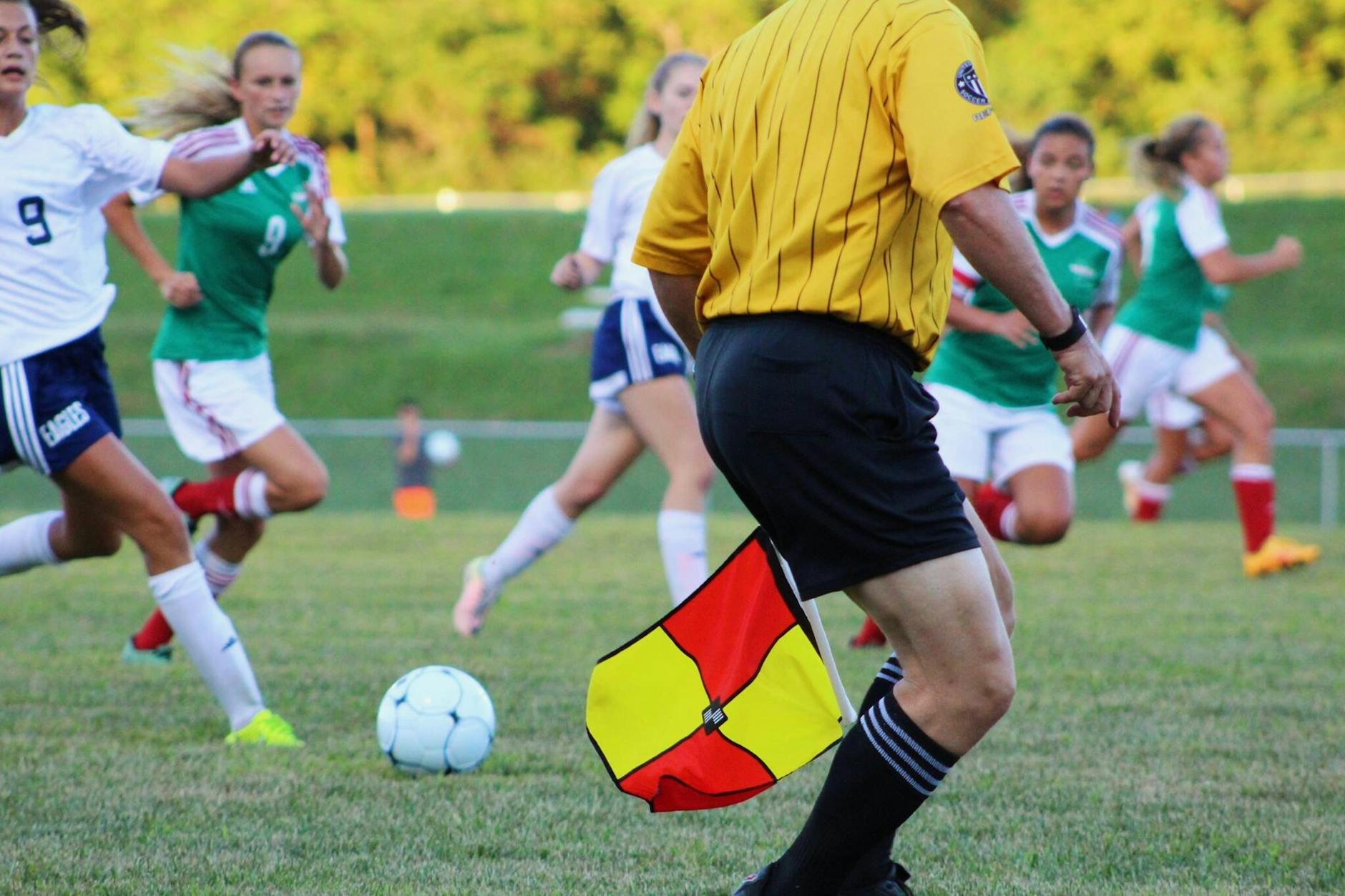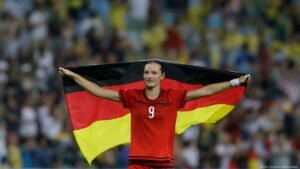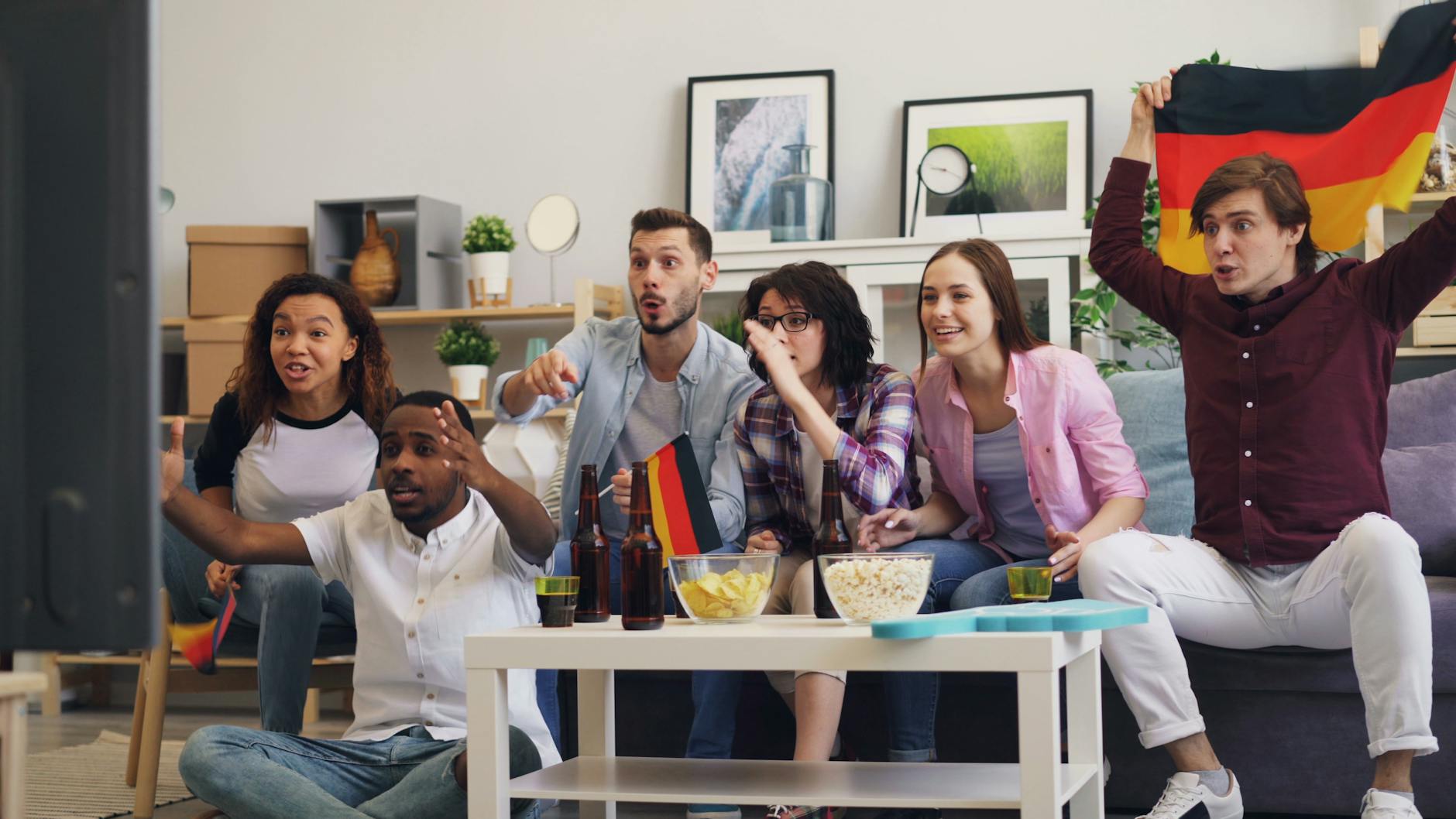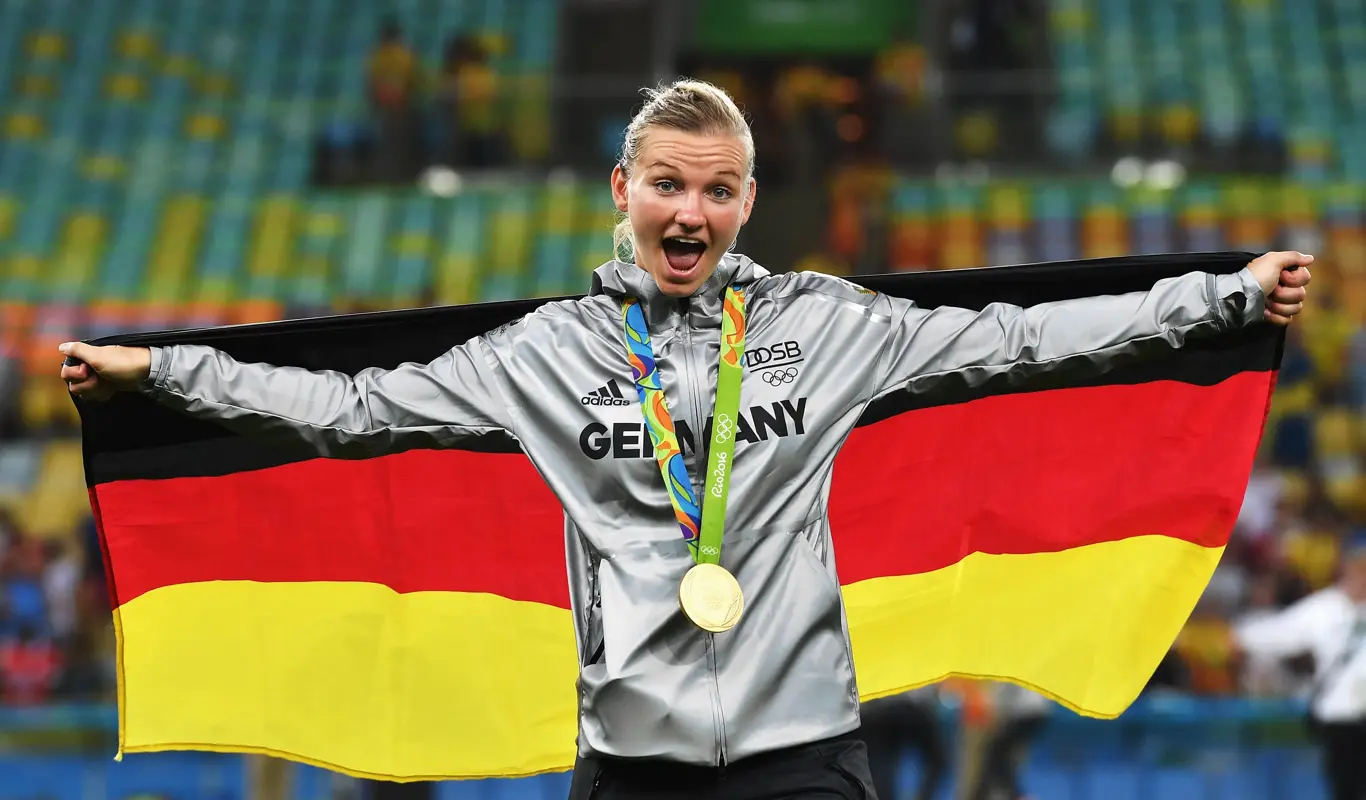Germany’s Popp to retire from international football

For years, I’ve watched Popp lead Germany with unparalleled skill and determination. Her powerful presence on the field and her knack for scoring crucial goals have been the backbone of our national team’s success. But now, as she hangs up her international boots, I can’t help but ponder the impact this will have on our squad and the future of women’s football in Germany.
In this blog post, I’ll take you through Popp’s illustrious career highlights, explore the reasons behind her retirement decision, and examine what this means for the German national team. We’ll also dive into Popp’s lasting legacy in women’s football and get a glimpse of what the future might hold for this incredible athlete. Join me as we celebrate and reflect on the remarkable journey of one of Germany’s greatest footballers
Alexandra Popp’s Career Highlights As I reflect on Alexandra Popp’s illustrious career, I’m struck by the incredible journey she’s had in German football. Her rise to prominence, the records she’s shattered, and the lasting impact she’s made on women’s soccer in Germany are truly remarkable. Let me take you through the highlights of her extraordinary career.
Rise to prominence in German football
I remember when Popp first burst onto the scene in German football. Her talent was evident from the start, and it didn’t take long for her to make her mark. At just 18 years old, she made her debut for the senior national team in 2010, and from that moment on, it was clear we were witnessing the emergence of a true star.
Popp’s journey began with FSV 2001 Bergisch Gladbach, where she honed her skills as a youth player. Her potential was quickly recognized, and she soon moved to FCR 2001 Duisburg. It was here that I saw her really start to shine. In 2008, she helped the team win the UEFA Women’s Cup (now known as the UEFA Women’s Champions League), showcasing her ability to perform on the big stage even at a young age.
Her performances at Duisburg caught the eye of VfL Wolfsburg, and in 2012, she made the move that would define her club career. At Wolfsburg, Popp truly came into her own, becoming one of the most feared strikers in women’s football.

Records and accolades
Throughout her career, Popp has amassed an impressive collection of records and accolades. Here’s a look at some of her most notable achievements:
-
7x Bundesliga titles (all with VfL Wolfsburg)
-
9x DFB-Pokal wins
-
2x UEFA Women’s Champions League titles
-
2x Olympic Gold medals (2016 Rio Olympics, 2021 Tokyo Olympics)
-
2013 UEFA Women’s Euro runner-up
-
2016 UEFA Best Women’s Player in Europe Award nominee
One of the most impressive aspects of Popp’s career has been her consistency. She’s been a key player for both club and country for over a decade, consistently delivering goals and performances when it matters most.
| Competition | Appearances | Goals |
|---|---|---|
| Bundesliga | 184 | 111 |
| DFB-Pokal | 46 | 46 |
| Champions League | 54 | 22 |
| National Team | 128 | 62 |
These numbers speak volumes about Popp’s impact on the pitch. Her goal-scoring record, particularly for the national team, puts her among the all-time greats of German football.
Impact on women’s soccer in Germany
I can’t overstate the impact Popp has had on women’s soccer in Germany. She’s been more than just a player; she’s been an ambassador for the sport, inspiring countless young girls to take up football.
Popp’s success has coincided with a period of growth for women’s football in Germany. Her performances have helped raise the profile of the Bundesliga and the national team, attracting more fans and media attention to the women’s game.
What sets Popp apart is not just her skill on the pitch, but her leadership and determination. She’s been a vocal advocate for equality in football, pushing for better conditions and recognition for women players. Her influence extends beyond the pitch, making her a role model for aspiring footballers across the country.
Key achievements in international tournaments
While Popp’s club achievements are impressive, it’s her performances in international tournaments that have really cemented her place in football history. Here are some of her standout moments on the international stage:
-
2010 FIFA U-20 Women’s World Cup: Popp announced herself to the world by winning the Golden Ball and Golden Boot as Germany claimed the title.
-
2016 Rio Olympics: She played a crucial role in Germany’s gold medal-winning campaign, scoring in the final against Sweden.
-
UEFA Women’s Euro 2022: Despite Germany finishing as runners-up, Popp’s performance was outstanding. She scored in every game she played, becoming the first player to do so in a single Women’s Euro tournament.
-
FIFA Women’s World Cup 2023: Although Germany’s campaign ended earlier than expected, Popp’s leadership and goal-scoring ability were on full display.
One of the most heartbreaking moments of Popp’s career came in the UEFA Women’s Euro 2022. After an incredible tournament where she scored six goals in five matches, she was forced to withdraw from the final due to injury. Despite this setback, her performance throughout the tournament was a testament to her skill and determination.
Popp’s ability to perform in high-pressure situations has been a hallmark of her career. Whether it’s scoring crucial goals in major tournaments or leading by example in difficult matches, she’s consistently risen to the occasion.
As I look back on Popp’s career highlights, it’s clear that she’s left an indelible mark on German football. Her journey from a promising young talent to one of the most respected figures in women’s soccer is truly inspirational. While her retirement from international football marks the end of an era, the impact she’s had on the sport will continue to be felt for years to come.
Now that we’ve explored Popp’s incredible career, it’s important to understand the reasons behind her decision to retire from international football. This decision, while difficult, is rooted in a combination of personal and professional factors that have shaped her journey in the sport.
As I reflect on Alexandra Popp’s recent announcement to retire from international football, I can’t help but ponder the various factors that might have influenced her decision. Having followed her career closely, I believe there are several compelling reasons behind this significant move.

A. Future plans outside of international football
One of the primary reasons I see for Popp’s retirement from the international stage is her desire to focus on future plans beyond representing Germany. As a player who has dedicated so much of her life to the national team, it’s natural for her to seek new challenges and opportunities.
-
Club football focus: I suspect that Popp may want to devote more energy to her club career with VfL Wolfsburg. Without the demands of international duty, she can concentrate on helping her club achieve even greater success in domestic and European competitions.
-
Coaching aspirations: Many players transitioning out of their playing careers look towards coaching as a natural progression. I wouldn’t be surprised if Popp has aspirations to move into a coaching role, possibly starting with youth teams or as an assistant coach at the club level.
-
Media and punditry: Given her extensive experience and knowledge of the game, Popp could be considering a career in sports media or punditry. Her insights would be invaluable in analyzing matches and discussing the evolving landscape of women’s football.
-
Football administration: With her leadership skills and understanding of the sport, I can see Popp potentially taking on a role in football administration, perhaps working with the German Football Association (DFB) or even FIFA to further develop women’s football.
B. Personal goals and priorities
As athletes progress in their careers, their personal goals and priorities often shift. I believe this is likely true for Popp as well.
-
Work-life balance: After years of rigorous training schedules and frequent travel for international matches, Popp may be seeking a better work-life balance. Retiring from international duty could allow her more time for personal pursuits and relationships.
-
Family considerations: Many athletes choose to step back from the highest levels of competition to focus on family life. While I don’t have specific information about Popp’s family plans, this could be a factor in her decision.
-
New challenges: After achieving so much in international football, including multiple European Championship titles and an Olympic gold medal, Popp might be looking for new challenges outside of the sport to broaden her horizons and personal growth.
-
Mental health and well-being: The pressure of representing one’s country at the highest level can be immense. Popp’s decision could be influenced by a desire to prioritize her mental health and overall well-being.
Here’s a table summarizing some potential personal priorities that might have influenced Popp’s decision:
| Priority | Description | Potential Impact |
|---|---|---|
| Time | More control over schedule | Increased flexibility for personal life |
| Stress reduction | Less pressure from international expectations | Improved mental well-being |
| New experiences | Opportunity to explore interests outside football | Personal growth and development |
| Family | More time with loved ones | Stronger personal relationships |
C. Age and physical considerations
At 32 years old, Popp is at a stage in her career where physical factors play an increasingly important role in decision-making.
-
Recovery time: As players age, their bodies typically require more time to recover from the physical demands of high-level competition. By retiring from international football, Popp can manage her workload more effectively and potentially extend her club career.
-
Injury prevention: The risk of injuries tends to increase with age, especially with the added strain of international tournaments. I believe Popp’s decision could be partly motivated by a desire to minimize this risk and maintain her overall fitness.
-
Performance standards: Maintaining the high standards required for international football becomes more challenging as players get older. Popp may feel that now is the right time to step away while she’s still performing at a top level, rather than risking a decline in her abilities.
-
Long-term health: Looking beyond her playing career, Popp might be considering the long-term effects of continuing to push her body at the highest level. Retiring from international football could help preserve her health for the future.
-
Generational shift: As younger players emerge in the national team setup, Popp may feel it’s time to make way for the next generation of talent. This decision could be seen as a way to facilitate the team’s evolution and ensure a smooth transition.
Now that we’ve explored the potential reasons behind Popp’s retirement decision, it’s important to consider the implications this will have for the German national team. The team will undoubtedly feel the absence of such a talented and experienced player, but it also opens up opportunities for emerging stars to step into the spotlight.

Now that we’ve explored Alexandra Popp’s incredible career and the reasons behind her retirement, it’s time to delve into the impact this decision will have on the German national team. As someone who’s been closely following women’s football for years, I can tell you that Popp’s departure will undoubtedly leave a significant void. However, it also opens up new possibilities for the team’s evolution.
A. Opportunities for younger players
With Popp’s retirement, I see a golden opportunity for the next generation of German footballers to step up and make their mark. The absence of such a dominant figure in the team’s lineup will create space for emerging talents to showcase their skills and potentially become the new face of German women’s football.
Here’s a list of promising young players who could benefit from this transition:
-
Jule Brand (21 years old) – A versatile forward with immense potential
-
Lena Oberdorf (21 years old) – Already a midfield powerhouse at a young age
-
Klara Bühl (22 years old) – A dynamic winger with an eye for goal
-
Sydney Lohmann (23 years old) – A creative midfielder with excellent vision
-
Giulia Gwinn (24 years old) – A talented full-back with attacking prowess
These players have already shown glimpses of their talent on the international stage, and Popp’s retirement could be the catalyst they need to truly shine. I believe this transition period will be crucial in shaping the future of German women’s football.
B. Team morale and dynamics
Losing a player of Popp’s caliber and leadership qualities will inevitably impact team morale and dynamics. As someone who’s witnessed the influence of veteran players in team sports, I can attest to the significant role they play both on and off the field.
Here’s how I expect the team dynamics to shift:
-
Initial adjustment period: There may be a temporary dip in morale as the team comes to terms with Popp’s absence.
-
Emergence of new leaders: Other experienced players will need to step up and fill the leadership void left by Popp.
-
Increased responsibility: Younger players will feel a greater sense of responsibility to perform and contribute to the team’s success.
-
Evolving team culture: The team may develop a new identity and playing style without relying on Popp’s dominant presence.
-
Renewed motivation: The change could spark a renewed sense of purpose and motivation among the squad to prove themselves in the post-Popp era.
While the initial impact on team morale might be challenging, I believe it also presents an opportunity for growth and renewal within the squad.
C. Tactical adjustments required
As someone who’s analyzed countless football matches, I can confidently say that Popp’s retirement will necessitate significant tactical adjustments for the German national team. Her unique skill set and playing style have been central to the team’s tactics for years, and finding a way to compensate for her absence will be a key challenge for the coaching staff.
Here’s a breakdown of the tactical adjustments I anticipate:
| Aspect | With Popp | Post-Popp Adjustment |
|---|---|---|
| Formation | 4-2-3-1 with Popp as target striker | Possible shift to 4-3-3 or 4-4-2 |
| Playing Style | Direct play, utilizing Popp’s aerial ability | More emphasis on ground play and quick passing |
| Set Pieces | Popp as primary target for corners and free kicks | New set-piece routines and targets needed |
| Pressing | Popp leading the press from the front | Redistribute pressing responsibilities among forwards |
| Counterattacks | Long balls to Popp to hold up play | Quicker, more intricate counterattacking patterns |
These tactical changes will require time and patience to implement effectively. The coaching staff will need to experiment with different formations and strategies to find the best way to maximize the team’s potential without Popp.
D. Loss of leadership and experience
Perhaps the most significant implication of Popp’s retirement is the loss of her leadership and vast experience. As someone who’s been in locker rooms and witnessed the impact of veteran players, I can’t overstate the importance of these intangible qualities.
Popp’s leadership manifested in several ways:
-
On-field guidance: Her ability to read the game and direct teammates during matches was invaluable.
-
Mentorship: She played a crucial role in nurturing and advising younger players.
-
Big-game experience: Popp’s composure and performance in high-pressure situations set an example for the team.
-
Media handling: Her experience in dealing with media pressure shielded younger players from excessive scrutiny.
-
Cultural ambassador: Popp represented German women’s football with dignity on the global stage.
To fill this void, the German national team will need to cultivate new leaders within the squad. This process takes time and cannot be rushed. The coaching staff will need to identify players with leadership potential and provide them with opportunities to grow into these roles.
I believe that players like Svenja Huth and Sara Däbritz, who have been with the national team for several years, could step up to take on more prominent leadership roles. However, it’s important to note that leadership styles vary, and the team may need to adapt to a different type of leadership in the post-Popp era.
The loss of Popp’s experience will also be felt in crucial moments of big tournaments. Her ability to perform under pressure and guide the team through challenging situations was a key asset for Germany. The team will need to find new ways to maintain composure and make smart decisions in high-stakes matches.
As we look ahead to the future of German women’s football, it’s clear that Popp’s retirement marks the end of an era. While the implications for the national team are significant, I’m optimistic about the potential for growth and renewal. The challenges presented by her departure will ultimately forge a stronger, more adaptable German team that’s ready to write the next chapter in its storied football history.
Next, we’ll explore the lasting legacy Alexandra Popp leaves behind in women’s football, both in Germany and on the global stage.
